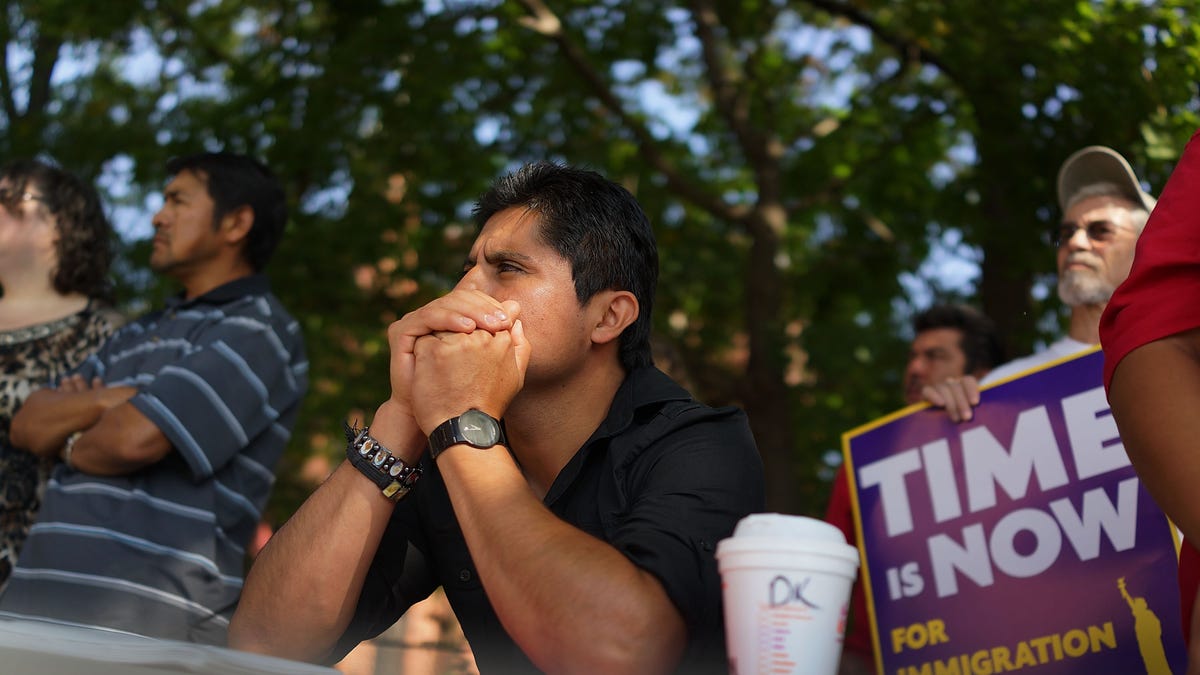
NEW HAVEN, CT - OCTOBER 05: Advocates for immigration reform gather as part of the National Day for Dignity and Respect on October 5, 2013 in New Haven, Connecticut. Attendees signed petitions, listened to speeches and celebrated the Connecticut immigrant community. About 175 marches and gatherings are expected to take place across the country on Saturday. An immigration reform bill was unveiled earlier this week by House Democrats. (Photo by Spencer Platt/Getty Images) (2013 Getty Images)
I am still hopeful that Congress will pass immigration reform. With millions of people in our country living in the shadows, unidentified, and strongly believing that every country needs to be able to decide who comes through its borders, I don’t see how Congress can continue to fail to act.
In 2009, I helped form a bipartisan working group on this critical issue in Congress. Until I left in January 2011, we met mostly weekly, sometimes twice a week.
Improving the efficiency of the agricultural worker visa program will allow the U.S. to maintain a reliable agricultural workforce. This, in turn, will allow the U.S. to continue producing its own food.
The existence of the working group never leaked; much less did the substance of our work product.
The bipartisan House group’s work product constitutes a serious contribution-in-waiting toward legislation to repair an immigration system in the U.S. which is clearly broken.
The Congressional Hispanic Leadership Institute (CHLI), which I am honored to chair, strengthens the U.S. Hispanic community by promoting the advancement of Hispanics in all sectors of American society, with a particular emphasis in mentoring and developing the leadership potential of Hispanic youth.
Because of the importance of the immigration issue to the future of the United States, for the first time in our 10-year history, CHLI formally adopted a position on a matter that is before Congress. The following principles were unanimously agreed to by CHLI’s Board of Directors:
1. An earned legalization process is the most reasonable way to address undocumented persons currently in the United States, and there should be special consideration for members of the U.S. Armed Forces and “Dreamers.”
2. All efforts should be made to expedite the transition to permanent legal status of qualified foreign undergraduate and graduate students studying in the United States who seek such status. Additionally, to improve the quality of education for all students, primary and secondary school education funding levels should be increased, particularly in Science, Technology, Engineering and Math (STEM) programs throughout the United States.
3. An expanded H-1B, L-1, and EB visa program for professionals and highly skilled workers, and H-2B temporary visas that support seasonal industries and small businesses, are critical to the U.S. economy.
4. Improving the efficiency of the agricultural worker visa program (H-2A) will allow the U.S. to maintain a reliable agricultural workforce. This, in turn, will allow the U.S. to continue producing its own food.
5. Delays, backlogs, and disruptions in the immigration and border management systems that impede the movement of people and legitimate cargo across U.S. borders must be addressed, and increased enforcement targeting human trafficking, drug smuggling, terrorism, and counterfeit goods across U.S. borders, is key to maintaining U.S. security and prosperity.
As a prime author of the Nicaraguan Adjustment and Central American Relief Act of 1997 (NACARA), which granted legal status to hundreds of thousands of worthy Central Americans in the U.S., I am convinced that it is possible to pass immigration legislation. Congress can and should pass immigration reform now.
